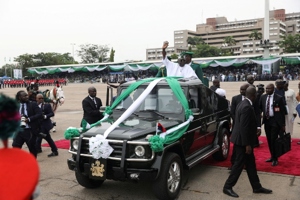Fuel subsidy removal to save Nigeria 'from going under', president says
(Reuters) - Nigeria's new President Bola Tinubu on Monday said his decision to remove a popular petrol subsidy would impose an extra burden on citizens but this would free up money for education, regular power supply, transport infrastructure and healthcare.
The subsidy had kept petrol prices cheap for decades in Africa's biggest economy but it became increasingly costly for the country - the government spent $10 B last year - leading to wider budget deficits and driving up government debt.
Petrol prices have nearly tripled in Nigeria, angering unions and causing a spike in transport costs. It has also hit small businesses and millions of households who rely on petrol generators for power due to intermittent grid supply.
In his first public comments since announcing the petrol subsidy removal after his swearing in on May 29, Tinubu said Nigerians should bear the decision to "save our country from going under."
"I admit that the decision will impose extra burden on the masses of our people. I feel your pain," said Tinubu, in a broadcast to mark Democracy Day.
"The government I lead will repay you through massive investment in transportation infrastructure, education, regular power supply, healthcare and other public utilities that will improve the quality of lives."
He did not give a timeline of when this would happen.
Scrapping the fuel subsidy was among the top reforms that Tinubu promised during the presidential election campaign.
Rating agencies Fitch and Moody's have said Tinubu's readiness to confront the fuel subsidy and plans to unify the country's multiple exchange rates was positive for the economy.







Comments